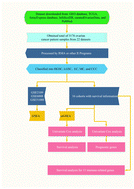Clinical significance of the immune microenvironment in ovarian cancer patients†
Abstract
Ovarian cancer is one of the leading causes of death from gynecologic malignancy in women. High-grade serous carcinomas, low-grade serous carcinomas, endometrioid carcinomas, clear cell carcinomas, and mucinous carcinomas with distinct pathological and clinical characteristics are the main histological subtypes of ovarian cancer. The majority of ovarian cancer patients are diagnosed at an advanced stage due to a lack of suitable screening tests for early detection and specific early symptoms. Despite progress in therapy improvements in ovarian cancer, most patients develop a recurrence within months or years after initial treatment. Given that the presence of tumor infiltrating lymphocytes is associated with prognosis and ovarian cancer is among the first cancers with an established association of immune cell infiltration, identification of the immune microenvironment in ovarian cancer is thought to be promising. In this study, to increase the understanding of tumor immune cell interactions, we undertook a study of tumor infiltrating lymphocytes in a large group of ovarian cancer patients. Our results suggested that tumor immune infiltrates of ovarian cancer were quite cohort and subtype dependent, and activated CD4+ T and CD8+ T tumor infiltrating lymphocytes were associated with good overall survival in the high-grade serous tumors. We found that high expression levels of the immune-related genes were associated with good prognosis in high-grade serous carcinomas. In addition, two different groups of prognostic genes were found in the high-grade and low-grade serous carcinomas, indicating that these two subtypes of serous carcinomas were two biologically and clinically different cancer types.



 Please wait while we load your content...
Please wait while we load your content...